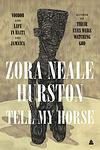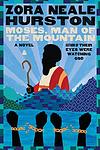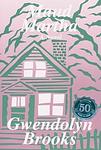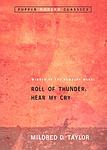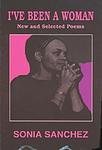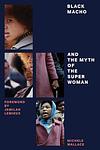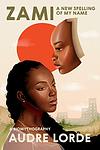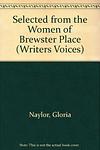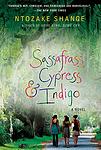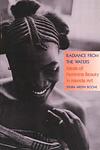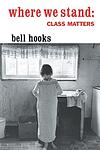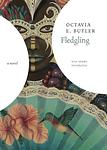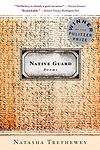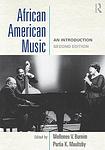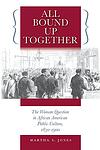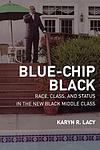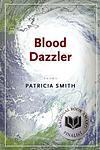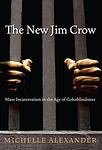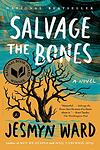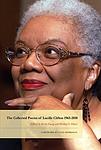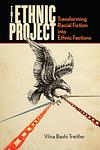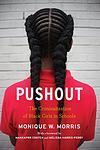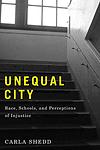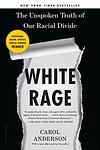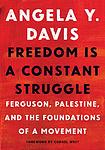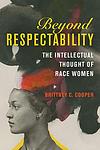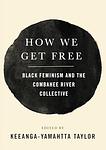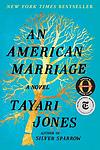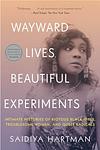The ZORA Canon: The 100 greatest books ever written by African American women
This is one of the 284 lists we use to generate our main The Greatest Books list.
-
Our Nig by Harriet E. Wilson
The book is a groundbreaking work of African American literature, providing a harrowing account of the life of a free black girl in the antebellum North who becomes bound as a servant to a cruel family. It explores themes of race, identity, and servitude as the protagonist endures physical and emotional abuse while struggling to maintain her dignity and spirit in the face of relentless oppression. The narrative serves as a powerful critique of the myth of Northern racial superiority and the complex social dynamics of race and class during the 19th century.
-
Incidents in the Life of a Slave Girl by Harriet Jacobs
This book is a poignant autobiography that depicts the life of a young woman born into slavery in the southern United States in the early 19th century. The narrative provides a harrowing account of her childhood and adolescence, marked by abuse and exploitation. In her desperate quest for freedom, she spends seven years in a tiny attic, hiding from her oppressive master. The narrative serves as a powerful critique of the brutalities of slavery, and a testament to the author's indomitable spirit and pursuit of freedom.
-
A Voice From The South by Anna Julia Cooper
"A Voice From The South" is a seminal work in African American literature and feminist thought, written by a prominent educator and scholar at the end of the 19th century. The book is a collection of essays that address a range of topics, including the education and empowerment of black women, racial uplift, and the intersection of race and gender. The author argues for the critical role of black women in the struggle for racial equality, advocating for their access to education and broader societal participation. She emphasizes the importance of their voices in the fight against oppression and in the shaping of a more just and equitable society. The work is notable for its early articulation of black feminist perspectives and its influence on later civil rights and feminist movements.
-
Iola Leroy by Frances Harper
The novel follows the life of Iola Leroy, a woman of mixed race who lives initially unaware of her African American heritage due to her light skin. After her family's secret is exposed and they are sold into slavery during the American Civil War, Iola embraces her identity and becomes an advocate for African American rights. The story delves into themes of racial identity, the brutality of slavery, and the struggle for emancipation. As Iola navigates the complexities of post-war society, she dedicates herself to improving the lives of her people through education, social work, and the fight for equality, embodying the resilience and hope of a nation seeking to heal from its divided past.
-
The Red Record by Ida B. Wells
The book in question is a pioneering work of investigative journalism and a searing indictment of lynching in the post-Civil War United States. The author, a prominent African American journalist and activist, meticulously documents the horrific practice of lynching, providing detailed accounts of specific incidents and statistical analysis to debunk the common justifications for such violence. The work exposes the systemic racism and injustice that African Americans faced, and it was instrumental in raising public awareness and galvanizing anti-lynching activism. The author's bravery in confronting this issue head-on, despite threats to her own life, underscores the book's importance as a historical document and a testament to the struggle for civil rights.
-
There Is Confusion by Jessie Fauset
"There Is Confusion" explores the complexities of African American life in the early 20th century, focusing on the intersecting lives of three young black protagonists from middle-class backgrounds. As they navigate the challenges of racism, societal expectations, and personal ambitions, the novel delves into themes of racial identity, class, gender roles, and the pursuit of the American Dream. The narrative weaves a rich tapestry of their experiences in New York City, highlighting the tension between assimilation and cultural heritage, and the struggle to achieve personal and professional success in a world rife with discrimination and prejudice.
-
Quicksand by Nella Larsen
"Quicksand" is a semi-autobiographical novel about a mixed-race woman named Helga Crane who, feeling out of place in both African-American and white societies, embarks on a journey of self-discovery. From the Southern United States to Denmark and back, she struggles with racial identity, sexual repression, and societal expectations, eventually marrying a reverend and becoming disillusioned with her life as a preacher's wife in the rural South. The novel explores themes of racial identity, class, and gender in the early 20th century.
-
Passing by Nella Larsen
"Passing" is a novel about two light-skinned African-American women, Irene Redfield and Clare Kendry, who can 'pass' as white. Set during the Harlem Renaissance, the story explores the intricacies and challenges of racial identity in 1920s America. Clare, who has chosen to live as a white woman, married to a racist who is unaware of her true heritage, risks everything when she reconnects with her childhood friend Irene, causing both women to grapple with their identities and desires, leading to tragic consequences.
-
Their Eyes Were Watching God by Zora Neale Hurston
This novel follows the life of Janie Crawford, a young African-American woman, in the early 20th century. She embarks on a journey through three marriages and self-discovery while challenging the societal norms of her time. The narrative explores her struggle for personal freedom, fulfillment, and identity against the backdrop of racism and gender expectations, ultimately emphasizing the importance of independence and personal growth.
-
Tell My Horse by Zora Neale Hurston
The book is an anthropological exploration of the rich cultural tapestry of Jamaica and Haiti in the late 1920s and early 1930s, delving into the rituals, customs, and social structures of the islands with a particular focus on Voodoo and Obeah practices. The author, an African American folklorist and writer, immerses herself in the communities she studies, providing vivid descriptions and analyses of ceremonies, dances, and religious practices, while also examining the political and social issues of the time. Her work offers a unique blend of personal narrative and scholarly observation, shedding light on the complexities and nuances of Caribbean culture and spirituality.
-
Moses, Man Of The Mountain by Zora Neale Hurston
In this novel, the iconic biblical tale of Moses is reimagined through a unique blend of folklore, cultural anthropology, and African American spirituality. The story follows Moses, a powerful and complex figure, as he leads his people out of Egypt and slavery, challenging both the Pharaoh's tyranny and the skepticism of his followers. The narrative weaves together themes of leadership, faith, and liberation, while exploring the intersections of race, religion, and power. The author infuses the ancient story with rich vernacular and a deep understanding of the African American experience, offering a fresh perspective on a timeless epic.
-
The Street by Ann Petry
The novel is a poignant exploration of the struggles faced by a young African American single mother living in Harlem during the 1940s. It delves into the systemic racism and sexism that constrict her life, as she endeavors to create a better future for her son amidst the poverty, violence, and oppressive social forces of the urban landscape. The narrative follows her tenacious fight against the insurmountable barriers imposed by a society that is indifferent to her dreams and her dignity, painting a vivid portrait of resilience and the human spirit's quest for freedom.
-
Maud Martha by Gwendolyn Brooks
The novel is a poignant exploration of the inner life of an African American woman navigating the complexities of identity, beauty, and dignity in 1940s Chicago. Through a series of vignettes, the protagonist reflects on the joys and challenges of her everyday experiences, from the nuances of family dynamics and marriage to the sting of racial prejudice and societal expectations. Her journey is one of self-discovery and resilience, as she seeks to affirm her worth and find contentment amidst the often harsh realities of her world.
-
Brown Girl, Brownstones by Paule Marshall
This novel explores the life of a young Barbadian-American girl growing up in Brooklyn during the Great Depression and World War II. The protagonist struggles with her identity as she navigates the cultural divide between her parents' traditional Barbadian values and her own American aspirations. The story delves into the themes of immigration, cultural identity, race, and gender, as the protagonist comes of age and seeks to establish her independence.
-
A Raisin In The Sun by Lorraine Hansberry
The play explores the dreams and struggles of a Black family living on Chicago's South Side in the 1950s. When the family receives a $10,000 insurance check after the father's death, each member has different ideas about how to use the money. The mother wishes to buy a house to fulfill her late husband's dream of providing a better home for the family, while her son wants to invest in a liquor store to secure their financial future. The daughter seeks to use part of the money for her medical school tuition. Their conflicting aspirations and the pervasive racism of the era put a strain on the family's unity and values, as they strive to find their place in a world that often seems to work against them.
-
Selected Poems by Gwendolyn Brooks
This collection is a curated anthology of poetry that showcases the breadth and depth of a 20th-century poet's work, known for her insightful, poignant, and vivid verse that captures the complexities of urban life, racial identity, personal struggle, and political engagement. The poems within reflect a journey through the African American experience, with a particular focus on the poet's own community in Chicago. The poet's mastery of traditional and experimental forms, combined with a sharp social consciousness and lyrical elegance, makes this compilation a significant contribution to American literature, offering readers a profound exploration of humanity through the lens of one of its most incisive observers.
-
Funnyhouse Of A Negro by Adrienne Kennedy
The play delves into the fragmented psyche of a young African American woman named Sarah, who grapples with her mixed-race identity and internalized racism in a society that imposes severe racial divisions. Through a series of surreal and symbolic vignettes, the protagonist confronts various historical figures and personal apparitions that represent different aspects of her heritage and her struggle with self-hatred. The narrative's non-linear structure and the haunting atmosphere of the "funnyhouse" reflect the turmoil and complexity of Sarah's mental state as she seeks to reconcile her place in a world rife with racial tensions and her own fractured sense of self.
-
Jubilee by Margaret Walker
The novel is a historical epic that follows the life of Vyry, the daughter of a white plantation owner and his black mistress, through her journey from slavery to freedom during and after the Civil War. Set in the American South, it paints a vivid picture of the brutal realities of slavery and the struggle for liberation. The protagonist's resilience and determination to overcome the oppressive systems of her time are central to the narrative, which is rich with themes of family, love, and the enduring human spirit in the face of injustice. The story is a testament to the strength and endurance of African American culture and heritage, as Vyry's life reflects the broader African American experience during one of the most tumultuous periods in American history.
-
The Flagellants by Carlene Hatcher Polite
The novel in question is a provocative exploration of the complexities of race, gender, and relationships within the turbulent context of the Civil Rights Movement. It delves into the psychological and emotional turmoil of an African American couple, who, through a series of intense and often confrontational dialogues, grapple with their personal demons and societal pressures. Their journey is marked by a raw and unflinching examination of identity, oppression, and the struggle for self-actualization, set against a backdrop of social upheaval and the quest for justice and equality in mid-20th century America.
-
The House Of Dies Drear by Virginia Hamilton
The novel is a gripping tale of mystery and history, centered around a young African American boy named Thomas Small and his family as they move into an old house that was once a station on the Underground Railroad. The house, known as Dies Drear, is rumored to be haunted by the ghosts of escaped slaves and the abolitionist who owned it. As Thomas explores his new home, he encounters secret passages, hidden rooms, and strange occurrences that suggest the rumors may be true. With the help of the caretaker's son, Thomas delves into the house's past to uncover its secrets and lay to rest the unsettled spirits of history. The story is a blend of supernatural elements and the harsh realities of American slavery, creating a suspenseful and educational narrative.
-
Coming Of Age In Mississippi by Anne Moody
The book is a powerful autobiographical account of a young African American woman's life growing up in rural Mississippi during the 1940s and 1950s. It vividly portrays the struggles with poverty, racism, and sexism in a deeply segregated society, as well as her burgeoning activism. The narrative follows her journey from childhood, through her college years, and into her involvement with the Civil Rights Movement, offering a personal perspective on the fight for racial equality in the United States. Her story is one of courage and determination, reflecting the broader experiences of many black Americans during a pivotal era in American history.
-
I Know Why the Caged Bird Sings by Maya Angelou
This memoir recounts the early years of an African-American girl's life, focusing on her experiences with racism and trauma in the South during the 1930s. Despite the hardships she faces, including sexual abuse, she learns to rise above her circumstances through strength of character and a love of literature. Her journey from victim to survivor and her transformation into a young woman who respects herself is a testament to the human capacity to overcome adversity.
-
To Be Young, Gifted, And Black by Lorraine Hansberry
The book is a posthumously published autobiography in the form of a montage of the late playwright's personal writings, letters, interviews, and journal entries. It offers an intimate look into the life of a trailblazing African American woman who navigated the complexities of identity, race, and gender in mid-20th-century America. Through her eloquent and passionate prose, the book captures the spirit of the Civil Rights Movement and the author's own struggles and triumphs as she became the first black woman to have a play performed on Broadway. It serves as an inspiring testament to her enduring legacy and the power of the written word to challenge societal norms.
-
The Black Woman: An Anthology by Toni Cade Bambara
This anthology is a groundbreaking collection of writings that delve into the multifaceted experiences of Black women in America. It brings together a diverse array of voices, including essays, poems, and stories that explore themes of race, gender, and social justice. The contributors, ranging from activists to artists, offer powerful insights into the struggles and triumphs of Black womanhood, providing a platform for expression and dialogue that challenges societal norms and champions the resilience and strength of Black women throughout history. The work serves as both a critical examination of the intersectional issues Black women face and a celebration of their contributions to culture and society.
-
We A Badd Ddd People by Sonia Sanchez
"We A BaddDDD People" is a powerful collection of poems that delve into the African American experience, exploring themes of racial identity, cultural heritage, and political activism. The poet uses innovative language, rhythm, and structure to convey the struggles and resilience of Black communities, often employing African American Vernacular English to authentically voice the emotions and realities of the people. The work serves as both a call to action and a celebration of Blackness, challenging readers to confront social injustices while simultaneously honoring the strength and beauty of the African American spirit.
-
The Third Life Of Grange Copeland by Alice Walker
This novel explores the harrowing journey of an African American man in the rural South, who, after years of enduring economic hardship and the oppressive racial dynamics of the mid-20th century, abandons his family in search of a better life. The narrative delves into the consequences of his actions, particularly on his wife and son, and examines the cycle of violence, poverty, and despair that plagues his community. As he returns home years later, seeking redemption and a third chance at life, the story poignantly addresses themes of resilience, the impact of systemic racism, and the possibility of personal transformation amidst seemingly insurmountable challenges.
-
Gorilla, My Love by Toni Cade Bambara
The book is a collection of short stories that delve into the lives of African Americans, primarily focusing on the experiences of young girls and women as they navigate a world marked by poverty, racism, and gender inequality. The stories are set in both rural and urban landscapes and are characterized by their vibrant dialogue and richly drawn characters. Through the eyes of these characters, the collection explores themes of family, community, identity, and resilience, offering a poignant and often humorous look at the complexities of growing up and asserting oneself in a society that frequently marginalizes and overlooks the voices of black women and children.
-
Sula by Toni Morrison
The novel is a poignant tale of two African American girls, Nel and Sula, growing up in the racially segregated town of Medallion, Ohio. The narrative explores their friendship, personal struggles, and the societal expectations imposed on them. Sula, the more rebellious of the two, leaves town to live a life of freedom and independence, while Nel chooses to conform to societal norms, marrying and raising a family. When Sula returns, their friendship is tested due to a betrayal, and the town labels Sula as evil. The book delves into themes of friendship, betrayal, individuality, and the societal roles of women.
-
Oreo by Fran Ross
This novel is a satirical and bold exploration of identity, following the journey of a young biracial girl as she navigates the complexities of her heritage. Born to a Jewish father and an African American mother, the protagonist embarks on a quest to find her estranged father, using her wit, her unique cultural background, and a secret guidebook passed down from her grandmother. Along the way, she encounters a variety of eccentric characters and experiences that challenge societal norms and stereotypes, all while showcasing the protagonist's sharp humor and intelligence. The book is a comedic and poignant commentary on race, ethnicity, and the search for self in a world obsessed with labels.
-
Corregidora by Gayl Jones
The novel centers on Ursa Corregidora, a young African American blues singer in the 20th century, who grapples with the legacy of trauma passed down from her enslaved ancestors. Haunted by the stories of brutality and sexual exploitation told by her great-grandmother and grandmother, both of whom were victims of a Portuguese slaveholder named Corregidora, Ursa navigates her personal relationships and her identity as a black woman. The narrative delves into themes of memory, history, and the enduring impact of slavery on the present, as Ursa seeks to reconcile her heritage with her own experiences of love, sexuality, and artistic expression.
-
Eva's Man by Gayl Jones
The novel centers around an African American woman who is incarcerated in a mental institution for poisoning and castrating her lover. Through a series of flashbacks and introspective musings, the narrative delves into her troubled past, exploring themes of sexual and emotional abuse, racial oppression, and the protagonist's complex relationships with the men in her life. The story is a harrowing examination of the protagonist's psyche and the societal forces that have shaped her experiences, ultimately leading to her act of violence. The novel's fragmented structure and poetic prose challenge readers to piece together the reality of the protagonist's life and the events that led to her incarceration.
-
For Colored Girls Who Have Considered Suicide When The Rainbow Is Enuf by Ntozake Shange
This book is a groundbreaking work of feminist literature, a choreopoem that weaves together 20 separate poems with music and dance to tell the stories of seven women who have suffered oppression in a racist and sexist society. Each woman is represented by a color, and through a series of poetic monologues, they share their experiences with love, abandonment, domestic violence, and sexual assault, ultimately finding strength in their shared womanhood and the resilience of their cultural heritage. The work celebrates the power of speaking out, the healing potential of community, and the unbreakable spirit of women of color.
-
Roll of Thunder, Hear My Cry by Mildred D. Taylor
Set in Mississippi during the Great Depression, this novel follows the life of a young African American girl and her family who are struggling to maintain their integrity, pride, and independence in the face of racism and social injustice. The family owns a piece of land which provides them some protection from the harsh realities of racial discrimination. The story is a poignant exploration of how they navigate through a prejudiced society, face social and economic challenges, and fight to keep their land.
-
Meridian by Alice Walker
The novel explores the life of a young African American woman in the 1960s and 1970s as she navigates the civil rights movement in the South. Through her journey, she grapples with the complexities of social change, personal sacrifice, and the struggle for racial equality. The protagonist's commitment to activism leads her to confront her own past traumas and the toll that relentless activism can take on one's personal life. As she evolves, she embodies the resilience and transformation that parallel the tumultuous era she is a part of, ultimately seeking a path that harmonizes her own well-being with her dedication to social justice.
-
Song of Solomon by Toni Morrison
The novel explores the life of an African-American man, Macon "Milkman" Dead III, from birth to adulthood. Set against the backdrop of racial tension in the mid-20th century United States, it delves into his journey of self-discovery and understanding his heritage. As Macon embarks on a literal and figurative journey south to reconnect with his roots, he encounters various characters that help him understand his family history and the power of community. The narrative is deeply rooted in African-American folklore and mythology, offering a profound commentary on identity, personal freedom, and the destructive power of racism.
-
I've Been A Woman: New And Selected Poems by Sonia Sanchez
This collection is a powerful exploration of the African American female experience, articulated through poetry that weaves together themes of love, loss, identity, and resistance. The poet's work spans several decades, offering both new and previously published poems that resonate with emotional depth and political consciousness. Through her lyrical mastery and engagement with the complexities of being a woman of color, the poet confronts societal injustices while celebrating the resilience and strength found within her community. Her verses serve as a testament to personal and collective struggles, as well as a call to activism and empowerment.
-
Black Macho And The Myth Of The Black Superwoman by Michele Wallace
The book critically examines the black power movements of the 1960s and 1970s, arguing that they were deeply misogynistic and ultimately detrimental to the cause of black women. The author explores the dual stereotypes of the hypermasculine "black macho" and the strong, emasculating "black superwoman," both of which serve to undermine the struggle for racial equality by perpetuating damaging gender norms within the black community. Through personal narratives and cultural analysis, the work challenges readers to confront the complex intersections of race and gender, and to consider the ways in which these stereotypes have hindered the progress of black women in American society.
-
The Salt Eaters by Toni Cade Bambara
The novel centers around a healing event in a Southern black community, where a woman named Velma Henry is at the brink of a mental and emotional collapse and is being treated by a healer named Minnie Ransom. The story delves into Velma's personal struggles, her involvement in the civil rights and black nationalist movements, and her quest for self-realization and healing. Through a blend of flashbacks, spiritual encounters, and community interactions, the narrative explores themes of trauma, resilience, and the complexity of the African American experience, while also examining broader issues of race, gender, and societal change.
-
The Heart Of A Woman by Maya Angelou
The book is an autobiographical account that delves into the life of an African American woman navigating the complexities of her existence during the civil rights era. It explores her journey through personal growth, motherhood, and activism, as she moves from California to New York City, and eventually to Ghana. Along the way, she encounters notable historical figures and immerses herself in the struggle for racial equality, all while striving to find her own voice and identity. The narrative is a poignant reflection on love, resilience, and the enduring spirit of a woman determined to claim her place in a turbulent world.
-
Women, Race, And Class by Angela Davis
This book offers a compelling examination of the women's liberation movement in the United States, focusing on the intersections of gender, race, and class. It critically analyzes the complex dynamics within the struggle for women's rights, highlighting the significant contributions of Black women and the impact of racism and classism on the movement's trajectory. The author argues that the liberation of women is inextricably linked to the fight against racial and economic oppression, advocating for a more inclusive and intersectional approach to feminism that addresses the diverse experiences and challenges faced by women from different backgrounds.
-
Ain't I A Woman?: Black Women And Feminism by bell hooks
This seminal work in feminist theory examines the impact of sexism and racism on Black women throughout American history. It challenges the marginalization of Black women within both the feminist movement and civil rights discourse, arguing that the intersection of their racial and gender identities creates unique forms of oppression. The book critiques the mainstream feminist movement for its focus on white women's experiences and calls for a more inclusive approach that addresses the diverse and complex realities of Black women's lives. Through historical analysis and cultural critique, it advocates for a feminism that is truly universal and attentive to the ways in which race, class, and gender intersect.
-
All The Women Are White, All The Blacks Are Men, But Some Of Us Are Brave by Gloria T. Hull, Patricia Bell Scott, Barbara Smith
This book is a seminal anthology that explores the complex intersection of race and gender, particularly focusing on the experiences of Black women who have been historically marginalized and rendered invisible in both feminist and civil rights discourses. It brings together a diverse collection of essays, stories, and poems that highlight the unique struggles of Black women, challenging the monolithic narratives that often dominate discussions about feminism and race. The work serves as a foundational text in Black feminist thought, calling for the recognition of Black women's voices and their contributions to the broader movements for social justice and equality.
-
Zami: A New Spelling of My Name by Audre Lorde
This book is a biomythography, blending history, biography, and myth, of a young, black, lesbian woman growing up in 1950s Harlem. The narrative explores her early life, including her relationship with her immigrant parents, her sexual awakening, and her struggle to define her identity in a time of intense racial and homophobic prejudice. The protagonist's journey is marked by a series of women who shape her consciousness and her understanding of herself, leading her towards activism and writing.
-
The Women of Brewster Place by Gloria Naylor
The book is a poignant narrative that weaves together the lives of seven African American women living in a dilapidated urban housing development. Through a series of interconnected stories, it explores the struggles, hopes, and bonds of these women as they confront issues of racism, poverty, and sexism. The narrative delves into each woman's personal journey, revealing the resilience and solidarity that emerge within this close-knit community as they navigate the challenges of life in an environment that seems designed to suppress their voices and dreams.
-
Sassafrass, Cypress, And Indigo by Ntozake Shange
This novel explores the lives and struggles of three African American sisters from the South as they pursue their individual paths towards self-discovery and empowerment. Each sister embodies distinct artistic and cultural identities, with one becoming a weaver, another a dancer, and the third a musician and writer. Their stories, rich with elements of folklore and spirituality, weave together themes of family, heritage, and the quest for personal and artistic freedom. Through their journeys, the sisters confront issues of race, gender, and sexuality, navigating the complexities of love, responsibility, and the bonds that tie them to each other and their shared past.
-
The Color Purple by Alice Walker
Set in the early 20th century, the novel is an epistolary tale of a young African-American woman named Celie, living in the South. She faces constant abuse and hardship, first from her father and then from her husband. The story unfolds through her letters written to God and her sister Nettie, revealing her emotional journey from oppression to self-discovery and independence, aided by her relationships with strong women around her. The narrative explores themes of racism, sexism, domestic violence, and the power of sisterhood and love.
-
Fish Tales by Nettie Jones
"Fish Tales" is a collection of interconnected stories that explore the complexities of human relationships and the quirks of life in a small coastal town. Through a tapestry of vivid characters, the book delves into themes of love, loss, and the search for meaning. Each tale is infused with a sense of magical realism and the mystical allure of the sea, offering a window into the lives of the town's inhabitants as they navigate the ebb and flow of existence, much like the fish that swim beneath the ocean's surface. The stories are woven together with a lyrical prose that captures the rhythm of the coastal setting, creating a rich and immersive reading experience.
-
Home Girls by Barbara Smith
"Home Girls" is a groundbreaking collection of essays and writings that delve into the complex experiences of Black women, feminism, and lesbian activism. The anthology brings together a diverse array of voices from African American women who share their personal narratives, theoretical analyses, and literary works. Addressing issues such as racism, sexism, homophobia, and classism, the book serves as a powerful exploration of the intersections of identity and the political dimensions of Black women's lives. It highlights the importance of solidarity and the need for inclusive movements that recognize the unique challenges faced by Black women in a society structured by multiple and overlapping oppressions.
-
In Search Of Our Mothers' Gardens: Womanist Prose by Alice Walker
This compilation of essays delves into the struggles and achievements of African American women throughout history, exploring themes of race, gender, and creativity. The author reflects on the lives of historical figures, personal experiences, and the broader cultural heritage that has often been overlooked or suppressed. She coins the term "womanist" to describe a form of feminist thought that specifically addresses the unique experiences of black women, advocating for their strength, resilience, and the recognition of their contributions to society. The work is a celebration of the artistic and spiritual legacies passed down from the author's ancestors, particularly the metaphorical gardens cultivated by generations of women who, despite facing numerous adversities, managed to express their creativity and preserve their cultural identity.
-
When And Where I Enter by Paula Giddings
The book is a comprehensive historical analysis that delves into the complex and often overlooked experiences of Black women in America. It traces their struggles and contributions from the transatlantic slave trade to the civil rights movement, highlighting how their unique intersection of race and gender has shaped their activism, identity, and resistance against systemic oppression. The narrative weaves together the lives of well-known figures and unsung heroines, revealing the ways in which Black women have been pivotal in the fight for equality and justice, and how they have navigated the dual challenges of racism and sexism to influence American social, political, and cultural life.
-
Sister Outsider by Audre Lorde
"Sister Outsider" is a collection of essays and speeches that delve into the complexities of intersectional identity, exploring themes of racism, sexism, and homophobia. The author, a black lesbian poet and feminist writer, challenges the marginalization of minority groups and critiques the lack of inclusivity within feminist movements. Through personal narratives and powerful prose, the work confronts social injustices and calls for the recognition and celebration of differences as a means to drive political change and dismantle systemic oppression. The book is a seminal text in intersectional feminist thought, advocating for solidarity and the importance of communication across diverse communities.
-
Linden Hills by Gloria Naylor
The novel explores the lives of African Americans residing in an affluent suburban neighborhood, where success is measured by material wealth and social status. Through the experiences of two poets who take jobs as Christmas handymen in the community, the narrative delves into the complexities of race, class, and the cost of assimilation into white society. As they encounter the residents' stories, the poets uncover the hollow pursuit of the American Dream and the spiritual and moral decay festering beneath the surface of the seemingly perfect community. The book serves as a poignant critique of the sacrifices made in the name of upward mobility and the corrosive effects of systemic racism.
-
Radiance From The Waters by Sylvia Ardyn Boone
"Radiance From The Waters" is an anthropological study that delves into the intricacies of Mende culture, particularly focusing on the Sande society, which is an influential women's association in Sierra Leone. The book explores the Sande's use of masks, the significance of their initiation rituals, and the embodiment of ideals of femininity and beauty. Through a detailed examination of the society's practices and symbols, the work illuminates the ways in which Mende women exert social power and maintain cultural heritage, offering readers a nuanced understanding of West African social structures and gender roles.
-
Thomas And Beulah by Rita Dove
The book is a collection of interrelated poems that tell the semi-fictionalized story of an African American couple's life together in the early to mid-20th century. Through a series of lyrical narratives, the reader experiences the couple's journey from their courtship and marriage, through the trials and tribulations of the Great Migration, to their old age. The poems are divided into two parts, with the first half focusing on the husband's perspective and the second half on the wife's. The work explores themes of love, resilience, and the African American experience, capturing the nuances of their individual and shared lives against the backdrop of a changing America.
-
Blacks by Gwendolyn Brooks
The book is a collection of poetry that spans several decades of the author's career, offering a profound and insightful look into the African American experience. Through her masterful use of language, the poet explores themes of identity, race, social justice, and personal struggle. The poems range from intimate portraits of life in the black community to powerful statements on the broader implications of race in America. The work is a testament to the author's enduring legacy as a voice of both the civil rights movement and the ongoing quest for equality and human dignity.
-
Beloved by Toni Morrison
This novel tells the story of a former African-American slave woman who, after escaping to Ohio, is haunted by the ghost of her deceased daughter. The protagonist is forced to confront her repressed memories and the horrific realities of her past, including the desperate act she committed to protect her children from a life of slavery. The narrative is a poignant exploration of the physical, emotional, and psychological scars inflicted by the institution of slavery, and the struggle for identity and self-acceptance in its aftermath.
-
Assata by Assata Shakur
The book is an autobiography that delves into the life of a controversial African American activist who became a key figure in the Black Liberation Movement. Born into a time of racial strife, she recounts her journey from her childhood experiences of racism to her involvement in civil rights activism, and her eventual membership in the Black Panther Party. The narrative provides an intimate look at her struggles with the law, including her trial and conviction for a murder she insists she did not commit. Her story is one of resilience and defiance, as she becomes a symbol of resistance against systemic oppression, eventually seeking political asylum in Cuba after escaping from prison. The autobiography is not only a personal recounting but also a reflection on the broader issues of race, gender, and justice in America.
-
Black Eyed Susans And Midnight Birds by Mary Helen Washington
"Black Eyed Susans and Midnight Birds" is an anthology that explores the rich tapestry of African American women's literature. The collection brings together a diverse array of voices and experiences, showcasing poetry, fiction, and essays that delve into themes of identity, race, gender, and the struggle for equality. Through the works of various authors, the anthology highlights the unique cultural and historical perspectives of African American women, offering readers a profound insight into their artistic contributions and the societal challenges they have faced and continue to confront.
-
Invisibility Blues: From Pop To Theory by Michele Wallace
"Invisibility Blues: From Pop To Theory" is a critical exploration of the representation of African Americans in popular culture and the impact of these portrayals on both the black community and American culture at large. The book delves into a variety of media, including film, television, music, and literature, to examine how stereotypes and invisibility perpetuate racial biases. Through a series of essays, the author challenges readers to consider the subtle and overt ways that black people have been marginalized in the arts and how this reflects broader social and political issues. The work serves as a call to action for more nuanced and equitable representation in the cultural landscape.
-
Waiting to Exhale by Terry McMillan
This novel follows the lives of four African-American women living in Phoenix, Arizona, each of whom is "holding their breath" as they navigate their personal and professional lives. The women are all in their mid-thirties, successful, and single, struggling to find love in a world that seems to offer few prospects. Through their friendship, they support each other and learn to let go of their pasts, "exhale", and move forward.
-
Parable Of The Sower by Octavia E. Butler
In a dystopian future where society has collapsed due to environmental and economic crises, a young woman named Lauren Olamina possesses a unique ability to feel the pain and pleasure of others. As she witnesses her community being torn apart by violence and religious fanaticism, Lauren embarks on a perilous journey to find a new safe haven and establish her own religion based on empathy and survival. Through her thought-provoking narrative, the book explores themes of resilience, spirituality, and the power of human connection in the face of adversity.
-
Ugly Ways by Tina McElroy Ansa
The novel delves into the complex dynamics of a Southern African American family as they reunite in their Georgia hometown for the funeral of their domineering mother. The three sisters at the heart of the story confront their individual struggles, secrets, and resentments, all of which have been influenced by their late mother's critical and unyielding nature. As they navigate the emotional turmoil of their reunion, the sisters are forced to reckon with their pasts and the ways in which their mother's legacy has shaped their lives, for better or worse. The narrative weaves a rich tapestry of family bonds, personal growth, and the journey toward healing and understanding.
-
The Black Christ by Kelly Brown Douglas
"The Black Christ" is a theological exploration that examines the intersection of race, Christianity, and liberation. The book challenges traditional Eurocentric interpretations of Christianity by presenting Jesus Christ as a figure of black liberation theology. The author argues that understanding Jesus as the Black Christ has profound implications for the African American community, offering a source of hope and a framework for resistance against systemic oppression and racism. Through this lens, the book delves into the historical and contemporary struggles of black people, advocating for a faith that is deeply connected to social justice and the lived experiences of the oppressed.
-
The Selected Poems Of Nikki Giovanni: 1968 1995 by Nikki Giovanni
This collection is a compilation of poetry that spans nearly three decades of work from a prominent African American poet, showcasing her evolution as a writer and activist. The poems reflect on a wide range of themes, including race, social justice, love, and family, offering a powerful and lyrical commentary on American life and the African American experience. The poet's distinctive voice combines raw honesty with a passionate, sometimes playful, use of language, making her work both accessible and profound. Through her poetry, she has become a leading figure in the Black Arts Movement, inspiring generations with her unwavering commitment to civil rights and equality.
-
Killing The Black Body by Dorothy E. Roberts
This book is a critical examination of the ways in which the reproductive rights of African American women have been controlled and violated throughout American history. It delves into the intersection of race, gender, and class, revealing how black women's bodies have been subjected to coercive policies and practices, from the era of slavery to contemporary issues of forced sterilization and unequal access to reproductive healthcare. The work challenges readers to confront the systemic racism embedded in America's reproductive policies and to recognize the ongoing struggle for autonomy and justice faced by black women in the realm of reproductive freedom.
-
Parable of the Talents by Octavia E. Butler
Set in a dystopian future America ravaged by climate change and societal collapse, the novel follows the journey of a young woman who, despite facing slavery, violence, and the rise of a dangerous religious zealot, strives to build a community based on her own new belief system, Earthseed. Her vision is to create a society that can adapt and thrive amidst chaos, with the ultimate goal of taking humanity to the stars. Throughout her struggle, she documents her experiences and philosophies in the hope that they will guide future generations towards a more hopeful, resilient future.
-
Black Picket Fences by Mary Pattillo-McCoy
The book provides a sociological examination of the middle-class African American experience through the lens of a black neighborhood in a large American city. It challenges the conventional understanding of segregation and economic inequality by exploring the lives of the black middle class, their struggles, achievements, and the complex interplay of class and race. The author delves into the community's social dynamics, family structures, and the pressures faced by the youth, offering a nuanced perspective on the persistence of racial disparities within the ostensibly successful segment of the black population.
-
Where We Stand by bell hooks
In "Where We Stand," the author delves into the complex interplay of class and race in America, examining how socioeconomic status impacts individual identity and shapes the dynamics of power and privilege within society. Through personal anecdotes and critical analysis, the book challenges readers to confront the often-unspoken hierarchies that influence our lives and to consider the ways in which classism intersects with racism and sexism. The author advocates for a greater awareness of class issues and calls for solidarity across different social strata to create a more equitable and just society.
-
Topdog Underdog by Suzan-Lori Parks
The play centers around two African American brothers, Lincoln and Booth, who share a tenuous and competitive relationship marked by a troubled past. Lincoln, a former street hustler, now works as a Lincoln impersonator in a shooting gallery, while Booth aspires to be the greatest card hustler, practicing the three-card monte con that Lincoln has abandoned. As they navigate their sibling rivalry, the brothers grapple with their roles as the "topdog" and the "underdog" in a cycle of poverty and broken dreams. The narrative delves into themes of identity, family dynamics, and the struggle for power, culminating in a dramatic and tragic exploration of fate and the inescapable nature of their circumstances.
-
Ella Baker And The Black Freedom Movement by Barbara Ransby
This book is a comprehensive biography that chronicles the life and influence of a prominent civil rights activist who played a pivotal role in some of the most influential organizations of her time, including the NAACP, Martin Luther King Jr.'s Southern Christian Leadership Conference, and the Student Nonviolent Coordinating Committee. It delves into her commitment to grassroots organizing and participatory democracy, showcasing her belief in the power of the people to instigate social change. The narrative highlights her behind-the-scenes work, her emphasis on collective leadership, and her dedication to fighting racial and economic injustice, making a strong case for her as one of the most important, yet often overlooked, leaders of the civil rights movement.
-
Fledgling by Octavia E. Butler
"Fledgling" is a novel that blends science fiction with vampire lore, telling the story of a young amnesiac girl who discovers she is actually a genetically modified, 53-year-old vampire. As she slowly regains her memories, she learns about her unique vampire family, their complex societal structures, and the symbiotic relationships they maintain with humans. The narrative delves into themes of identity, race, sexuality, and consent, challenging traditional vampire myths while exploring the implications of power dynamics and prejudice within a reimagined society where vampires and humans coexist in a tenuous balance.
-
Directed By Desire: The Collected Poems Of June Jordan by June Jordan
This anthology is a comprehensive collection of the poetic works of a renowned activist and writer, showcasing her lifelong commitment to political, social, and cultural issues. The poems within span several decades, reflecting on themes such as love, identity, race, and feminism. The writer's voice resonates with passion and eloquence, offering readers a profound exploration of personal and collective experiences. Through her mastery of language and form, the poet articulates a vision that is at once intimate and universal, inviting readers to engage with the complexities of human existence and the pursuit of justice.
-
Native Guard by Natasha Trethewey
This Pulitzer Prize-winning poetry collection serves as a profound meditation on memory and the racial legacy of the American South. Through a blend of personal history and national narrative, the poems weave together the story of a mother's death, the poet's childhood in Mississippi, and the forgotten history of the Louisiana Native Guards, a black regiment assigned to guard Confederate prisoners of war. The work explores themes of loss, the intersection of personal and collective past, and the complex nature of remembrance, ultimately questioning what it means to be a native guardian to history's darker truths.
-
African American Music by Mellonee V. Burnim and Portia K. Maultsby
This book provides a comprehensive exploration of African American music, tracing its roots from the African continent through its development in the United States. It examines the various genres that have emerged from the African American experience, including spirituals, blues, jazz, gospel, R&B, rock, soul, and hip-hop. The text delves into the social, political, and cultural contexts that have shaped these musical styles, highlighting the significant contributions of African American artists and the profound impact their music has had on American culture and the world at large. Through a blend of historical analysis and musical examination, the book offers a deep understanding of the evolution and significance of African American music.
-
All Bound Up Together by Martha S. Jones
The book explores the complex role of African American women in the suffrage movement in the United States, from the antebellum period through the ratification of the Nineteenth Amendment. It delves into the intersection of race and gender, examining how black women navigated societal constraints to advocate for their rights and the rights of their communities. The narrative highlights the contributions of these women to the broader women's rights movement while also confronting the racial discrimination they faced from white suffragists and the broader society. Through a detailed historical account, the book reveals the multifaceted strategies black women employed to fight for political inclusion and social justice.
-
Blue Chip Black by Karyn R. Lacy
This sociological text delves into the lives of middle-class African Americans, exploring the strategies they employ to maintain their status and navigate predominantly white and black spaces. The author uses in-depth interviews and observations in two Washington, D.C. suburbs to examine how these individuals negotiate their racial identities, revealing the complexities of social mobility and the various ways in which they seek to provide the best opportunities for their families while also dealing with the challenges of racial discrimination and cultural expectations. Through this exploration, the book sheds light on the nuanced ways that race and class intersect in the United States.
-
A Mercy by Toni Morrison
"A Mercy" by Toni Morrison is a historical fiction novel set in the late 17th century in America. The story follows a young slave girl named Florens who is sold by her mother to a Dutch trader in exchange for a debt. Florens is then taken to a plantation in Virginia where she becomes part of a diverse group of women, including a Native American, a white indentured servant, and the plantation owner's wife. The novel explores themes of race, gender, and power dynamics as the women navigate their relationships with each other and the harsh realities of life in colonial America.
-
Blood Dazzler by Patricia Smith
The book is a powerful collection of poems that vividly captures the devastating fury of Hurricane Katrina as it ravaged New Orleans in 2005. Through a blend of voices, including that of the hurricane itself, the poems explore the physical and emotional impact of the disaster on the city's vulnerable populations, the government's inadequate response, and the resilience of the human spirit in the face of such overwhelming tragedy. The work serves as a poignant commentary on race, class, and the relationship between humans and nature, offering a raw and haunting look at one of the most catastrophic events in recent American history.
-
The Warmth Of Other Suns by Isabel Wilkerson
"The Warmth of Other Suns" is a powerful and deeply moving narrative that chronicles the Great Migration, a significant event in American history that saw millions of African Americans leave the South in search of better opportunities and freedom from racial oppression. Through the compelling stories of three individuals, the book explores the challenges, triumphs, and sacrifices made by these courageous migrants as they embarked on a journey to find a new life in the North and West, ultimately reshaping the social and cultural landscape of America.
-
The New Jim Crow by Michelle Alexander
"The New Jim Crow" is a thought-provoking and eye-opening book that examines the deeply ingrained racial bias within the American criminal justice system. Drawing on extensive research and personal anecdotes, the author explores how the War on Drugs has disproportionately targeted and marginalized Black communities, leading to a modern-day system of racial control and oppression. This powerful critique challenges readers to confront the systemic racism that continues to perpetuate inequality and injustice in the United States.
-
Salvage the Bones: A Novel by Jesmyn Ward
Set in a poor rural community in Mississippi, this novel follows the story of a pregnant teenage girl named Esch and her three brothers as they navigate their lives in the days leading up to Hurricane Katrina. Their mother is dead and their father is a neglectful alcoholic, leaving the siblings to fend for themselves. The book explores themes of poverty, racism, and survival, showcasing the resilience and strength of the human spirit in the face of adversity.
-
The Collected Poems Of Lucille Clifton by Lucille Clifton
This anthology gathers the powerful and evocative poetry of an influential American poet, whose work spans several decades, exploring themes of family, ancestry, and the African American experience with a clear, resonant voice. The collection showcases the poet's concise and accessible style, her use of vivid imagery and deep empathy to confront issues of gender, race, and oppression. Through her poems, she celebrates resilience, strength, and the human spirit, leaving a lasting impact on readers and contributing significantly to the landscape of contemporary poetry.
-
The Ethnic Project by Vilna Bashi Treitler
The book in question explores the complex dynamics of race and ethnicity in the United States, examining how various immigrant groups have navigated and shaped their identities within the country's racial hierarchy. It delves into the historical and sociological processes that have led to the assimilation of certain ethnic groups into the category of "whiteness," while others remain marginalized. Through a critical analysis of these ethnic projects, the book reveals the strategies employed by different groups to gain social acceptance and economic mobility, and how these efforts have contributed to the perpetuation of racial inequalities. The narrative challenges readers to reconsider the constructs of race and ethnicity and their impact on American society.
-
Things I Should Have Told My Daughter by Pearl Cleage
This book is a candid and introspective memoir that takes the form of a series of journal entries, offering a window into the personal life, thoughts, and experiences of a prominent African-American writer and activist. Through her reflections, she navigates the complexities of womanhood, motherhood, and professional life during the transformative decades of the 1970s and 1980s. The author's musings reveal her struggles with societal expectations, her involvement in the civil rights movement, and her journey towards self-discovery and empowerment, all while raising a daughter and grappling with the challenges of balancing her personal aspirations with her responsibilities as a parent.
-
Brown Girl Dreaming by Jacqueline Woodson
This is a poignant memoir written in verse, detailing the author's childhood as an African-American growing up in the 1960s and 1970s, split between South Carolina and New York. The narrative explores her experiences with segregation, her growing awareness of the civil rights movement, her deep love for storytelling and her gradual understanding of her own identity as a writer. The book provides a powerful portrayal of a girl finding her voice in a time of social and political unrest.
-
Dark Matters by Simone Browne
"Dark Matters" is a critical examination of how race and surveillance have intersected throughout history, particularly within the context of blackness. The book delves into the ways in which surveillance practices, both historical and contemporary, are rooted in racial discrimination and how these practices have served to enforce boundaries of social control. By exploring a range of topics, from the branding of slaves in the 18th century to modern-day policing and biometric technologies, the book challenges readers to consider the pervasive nature of surveillance and its disproportionate impact on black communities. Through this lens, the author reveals the deep-seated connections between visibility, race, and the monitoring of bodies in public and private spaces, urging a reevaluation of the role of surveillance in perpetuating systemic racial inequalities.
-
The Fifth Season by N. K. Jemisin
A woman searches for her kidnapped daughter in a world ravaged by a catastrophic climate change event known as the Fifth Season. Simultaneously, the narrative follows a young girl with destructive powers and a man struggling to control his own similar abilities. The story explores themes of oppression, survival, and the destructive power of nature, all set in a dystopian world where the earth is constantly in flux, and society is strictly divided and controlled.
-
Pushout by Monique W. Morris
The book examines the educational and criminal justice systems' intersectional challenges faced by Black girls in the United States. It explores the ways in which these young women are often misunderstood, marginalized, and subjected to punitive policies that lead to negative outcomes, such as high suspension rates and involvement in the juvenile justice system. Through personal narratives, data analysis, and critiques of existing policies, the book highlights the need for more compassionate and effective approaches to support Black girls in their educational journeys and to dismantle the school-to-prison pipeline that disproportionately affects them.
-
Sweat by Lynn Nottage
"Sweat" is a powerful drama that delves into the lives of factory workers in Reading, Pennsylvania, as they grapple with deindustrialization, economic instability, and the resulting social tensions that arise in the early 2000s. The play explores the complexities of friendship, race, and class against the backdrop of a once-thriving steel town that is now facing job losses and the erosion of the American Dream. As the characters confront layoffs and picket lines, their close-knit relationships are tested, revealing the personal and collective struggles of a community in a world where work, which once promised security and identity, becomes a source of uncertainty and division.
-
Unequal City by Carla Shedd
"Unequal City" examines the intersection of race, class, and education in the urban environment, focusing on how the American educational and criminal justice systems shape the lives of young people in Chicago. The book delves into the experiences of Chicago high school students, highlighting the stark disparities they face based on where they live and go to school. Through a sociological lens, it explores the systemic inequalities that are perpetuated by institutional policies and practices, revealing how schools and policing policies not only reflect but also reinforce existing social hierarchies, contributing to a cycle of disadvantage for minority and low-income youth.
-
White Rage by Carol Anderson
The book in question examines the complex history of structural racism in the United States, particularly focusing on the insidious ways in which white Americans have resisted and undermined African American progress following the Civil War. It explores the backlash against African American advancement, from the Reconstruction era through to the present day, revealing how systemic racism has been perpetuated by policies, laws, and judicial decisions. The narrative highlights the gap between America's professed ideals of equality and the stark realities of racial inequality, providing a critical analysis of the political and social mechanisms that have worked to maintain white dominance and impede black progress in America.
-
Whatever Happened To Interracial Love? by Kathleen Collins
The book is a poignant collection of short stories that delve into the complexities of race, gender, and love during the Civil Rights Movement era. The narratives explore the lives of African American characters, often focusing on educated, middle-class protagonists who grapple with the societal constraints and personal challenges of interracial relationships. Through a blend of humor, tragedy, and sharp insight, the stories reveal the intimate struggles of individuals striving for autonomy and connection in a world rife with discrimination and cultural upheaval.
-
Freedom Is A Constant Struggle by Angela Davis
This book is a collection of essays, speeches, and interviews that delve into the interconnectedness of struggles against state violence and oppression throughout history and around the world. The author, a prominent activist and scholar, draws parallels between various movements for social justice, including the civil rights movement in the United States, the fight against apartheid in South Africa, and the Palestinian liberation struggle. She emphasizes the importance of collective action and the need for solidarity across different causes, arguing that the fight for freedom is an ongoing and universal endeavor that requires persistence and an understanding of the historical and global contexts of resistance.
-
Beyond Respectability by Brittney C. Cooper
"Beyond Respectability" delves into the history of Black women's intellectual thought and the struggle for social justice, challenging the traditional narratives that often marginalize their contributions. The book examines the lives and work of several key African American women thinkers and activists from the late 19th through the 20th century, exploring how they navigated the intersections of race, gender, and class in their fight for equality. It critiques the concept of respectability politics, arguing that these women's radical ideas and actions laid the groundwork for contemporary understandings of Black feminism and intersectionality, while also highlighting the need to recognize and celebrate the intellectual labor of Black women in shaping progressive social movements.
-
How We Get Free by Keeanga-Yamahtta Taylor
The book is a compilation of interviews and essays that delve into the Black feminist movement, particularly focusing on the contributions and insights of the Combahee River Collective, a group of radical Black feminists who were active in the 1970s. It explores the collective's groundbreaking statement, which highlighted the intersectionality of race, gender, sexuality, and class, and its relevance to contemporary social justice movements. The work serves as both a historical document and a call to action, emphasizing the importance of Black feminism as a transformative force for systemic change and the empowerment of marginalized communities. Through personal narratives and critical analysis, the book provides a powerful examination of the past and present struggles for equality and liberation.
-
Sing, Unburied, Sing by Jesmyn Ward
The novel explores the journey of a 13-year-old boy, his drug-addicted mother, and his baby sister as they travel through Mississippi to pick up their white father from the state penitentiary. The story is steeped in the harsh realities of poverty, racism, and struggle, and is further complicated by the presence of a ghost from the family's past. It's a haunting tale about the legacy of trauma and the power of family ties.
-
An American Marriage by Tayari Jones
The book is a profound exploration of love, loyalty, and justice, centered on a young African American couple whose lives are shattered when the husband is wrongfully convicted of a crime he didn't commit. The narrative delves into the emotional turmoil that ensues, as the wife struggles with her obligations to her husband and her own desires for happiness. Through a series of letters exchanged between the couple during the husband's incarceration, and the perspectives of those entangled in their plight, the story examines the complexities of marriage, the impact of racial injustice on personal relationships, and the resilience required to overcome profound adversity.
-
Race After Technology by Ruha Benjamin
This book critically examines the intersection of technology and race, revealing how digital tools and platforms often perpetuate existing racial biases and inequalities. It delves into the concept of the "New Jim Code," where discriminatory designs are embedded in the architecture of various technologies, from automated decision-making systems to predictive policing algorithms. The author challenges the notion that technology is neutral, arguing that it often reinforces systemic discrimination, and calls for a more inclusive and equitable approach to tech development that actively confronts and dismantles these embedded prejudices.
-
Wayward Lives, Beautiful Experiments by Saidiya Hartman
The book examines the social and cultural history of African American women in the early twentieth century, particularly in New York and Philadelphia. It explores the ways in which these women defied conventional norms and constraints, creating new forms of intimacy, kinship, and freedom amidst the harsh realities of racism and sexism. Through a blend of historical research and imaginative reconstruction, the narrative delves into the intimate lives of young black women who sought to carve out a space for themselves, challenging the pathologized narratives that have often overshadowed their agency and innovation in the face of systemic oppression.
-
Magical Negro by Morgan Parker
This book is a provocative and incisive collection of poetry that explores black American womanhood, identity, and the pervasive impact of systemic racism. The poems weave a narrative that confronts the objectification of black bodies, the commodification of black pain, and the struggle to assert individuality in the face of historical stereotypes. The author employs the concept of the "magical negro," a trope in which black characters exist primarily to aid white narratives, as a lens to critique cultural appropriation and the burden of representation. Through vivid imagery and emotional depth, the collection challenges readers to confront uncomfortable truths about race and society.
Zora, 100 Books
The ZORA Canon is a distinguished list featuring the 100 greatest books by African American women, marking a first in acknowledging this specific literary group. Rooted in a deep cultural tradition, it spans 160 years of literature, from pre-emancipation times to the present. The selection includes a wide array of genres, such as fiction, nonfiction, plays, anthologies, and poetry, covering a range of topics from historical to personal narratives. This list was meticulously compiled by a panel of experts in African American women's literature. It not only celebrates the contributions of these authors but also serves as a comprehensive reference for readers. The ZORA Canon is a tribute to underrecognized writers and a gateway for exploring the rich cultural and literary history of African American women.
Added 3 months ago.
This list has a weight of 57%. To learn more about what this means please visit the Rankings page.
Here is a list of what is decreasing the importance of this list:
- List: only covers 1 specific country
- List: only covers 1 specific gender
If you think this is incorrect please e-mail us at [email protected].









